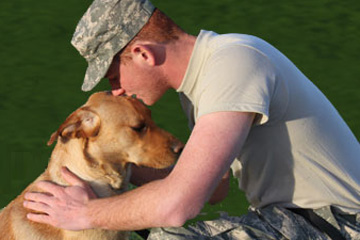
By Ryann Nickerson | University Communications
AURORA, Colo. (March 3, 2015) – With scores of military veterans returning from Iraq and Afghanistan, a University of Colorado Anschutz Medical Campus researcher is examining the therapeutic impacts of service dogs on their mental and physical health.
“We are finding that service dogs are improving the health of our returning wounded warriors,” said Cheryl Krause-Parello, PhD, R.N. at the CU College of Nursing. “Through the C-P.A.W.W. program, veterans are reporting that they are more empowered to speak about their experiences and advocate for their own health needs. With this knowledge, we hope to pair more service animals with more veterans, and ultimately, change the face of veteran care and public policy.”
Krause-Parello founded C-P.A.W.W., or Canines Providing Assistance to Wounded Warriors, as a way to train dogs, including shelter dogs, to assist returning veterans suffering both physical wounds and mental trauma like depression and post-traumatic stress disorder.
Inspired by her husband, a Marine Corps veteran, Krause-Parello’s research is focused on the benefits of animal-assisted interventions in restoring long-term health and well-being to returning active-duty military veterans. She hopes to assemble enough evidence to show the value of these dogs and eventually have them covered as a reimbursable medical expense. A fully trained service dog can cost up to $30,000.
“We really like the model of working with shelter dogs,” Krause-Parello said. “It cuts down the wait time for a service dog – which can sometimes be more than a year – and it gives both the veterans and the dogs a second chance.”
Since 2001, some 2.5 million servicemen and women have been deployed to Iraq and Afghanistan. And C-P.A.W.W. has a range of community partnerships that support the unique health-care needs of these veterans.
“We are currently examining the impact of animal-assisted intervention on a population of older veterans at the local VA hospital,” said Jessica Grey, a research assistant working with Krause-Parello. “In addition, we are in the process of recruiting and interviewing veterans who have service dogs with the hope of building a larger project from the information obtained.”
For more information visit the C-PAWW website.
Contact: Ryann.Nickerson@ucdenver.edu




